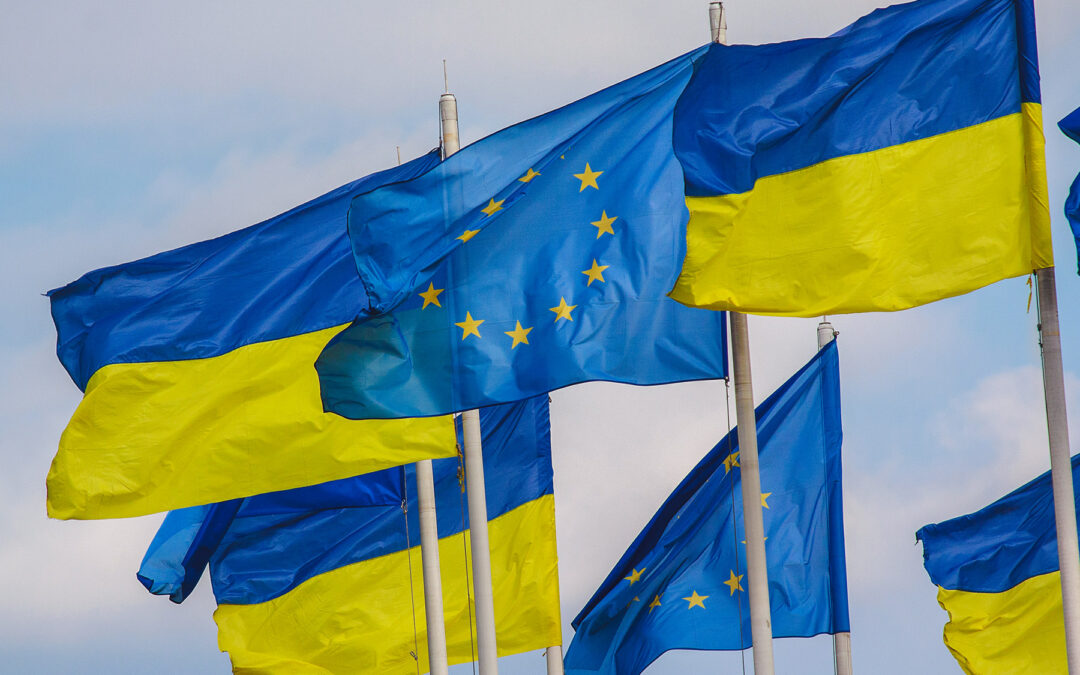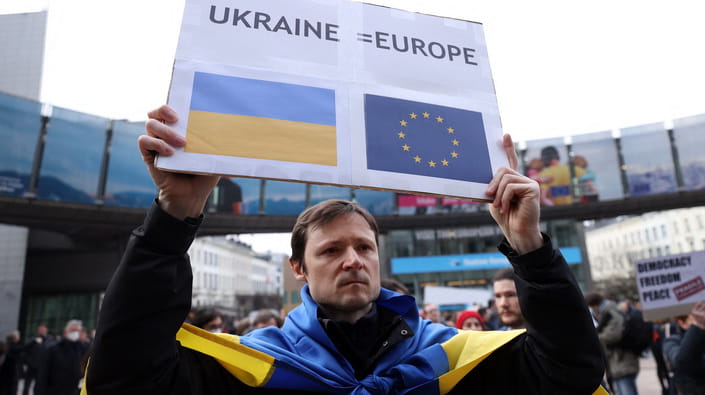Zelenski espera que Ucrania cuente con estatus de candidato a la UE en junio / Ukraine’s EU Application Is Splitting Europe in Two
KIEV.- El presidente ucraniano, Volodímir Zelenksi, reiteró hoy su esperanza de que su país obtenga en junio el estatus de país candidato a la Unión Europea (UE) después de que el presidente polaco, Andrzej Duda, le asegurara el apoyo de Polonia y el suyo personal.
En una rueda de prensa conjunta con Duda en Kiev, Zelenski afirmó que Ucrania pertenece a la comunidad europea desde hace mucho tiempo, pero que para entrar en la UE necesita «embajadores y amigos poderosos», según informa la agencia polaca PAP.
«Creemos que esto ocurrirá y contamos con el estatus de país candidato a la UE en junio. Contamos con el poderoso apoyo de Andrzej en esta cuestión», dijo.
Zelenski aludió al «discurso histórico» de Duda ante la Rada Suprema (Parlamento ucraniano), el primero de un líder extranjero desde el 24 de febrero, día del inicio de la invasión rusa, en el que el presidente polaco aseguró que «Polonia apoya y seguirá apoyando a Ucrania».
«Personalmente, no descansaré hasta que Ucrania se convierta en miembro de la Unión Europea», afirmó.
Posteriormente, en rueda de prensa, hizo un llamamiento a los líderes de la UE y subrayó el gran significado psicológico y político que tendría la concesión a Ucrania del estatus de candidato en la reunión del Consejo Europeo de finales de junio.
«Hoy Ucrania necesita nuestra señal de apertura de las puertas europeas», dijo, al tiempo que señaló que la sociedad ucraniana quiere formar parte de la comunidad europea y no de una esfera de influencia rusa, y afirmo que «esta es una de las razones por las que hoy defienden valientemente su país contra la agresión rusa».

Subrayó la necesidad de «mantener la unidad con Ucrania» y «la unidad en torno a Ucrania» dentro de la UE y la OTAN y subrayó que el pueblo ucraniano necesita apoyo no sólo en forma de suministro de armas o ayuda humanitaria, sino también a nivel político y social.
Duda afirmó, además, que «el mundo puede contribuir pacíficamente a poner fin a la guerra solo a través de sanciones, sólo a través de una fuerte presión sobre Rusia, solo aislándola, excluyéndola de la comunidad internacional».
En ese sentido, subrayó la importancia del sexto paquete de sanciones de la UE contra Rusia y para aquellos países que tienen dudas, entre otras cosas por los problemas para diversificar suministros, enfatizó la necesidad de «encontrar la manera de parar a Rusia» y hacer que la guerra deje de ser rentable para Moscú.
Agregó que en prácticamente tres meses, «Rusia básicamente no ha logrado alcanzar ninguno de sus objetivos estratégicos en su totalidad» y «de hecho, esta guerra es simplemente una derrota para Rusia».
«Pero Rusia es muy fuerte y esta guerra continuará a menos que la comunidad internacional contribuya a su final», dijo, e hizo un llamamiento al mundo para que preste ayuda militar constante a Ucrania.
EFE

Ukraine’s EU Application Is Splitting Europe in Two
Ukraine’s bid to join the European Union has left the bloc struggling to square its support for Ukraine with the concerns of western member states, many of which are skeptical of enlargement and wary of setting a precedent of “fast-track” membership.
Member states appear largely open to eventual Ukrainian membership, but division between east and west has arisen as to exactly how and when this might happen.
The road to Brussels is long and, at times, painful for aspirants. The journey can typically take around a decade, involving labyrinthine negotiations and structural national reforms. The shortest process was for Austria, Finland, and Sweden—all took nearly five years to meet the criteria. Negotiations to expand into eastern Europe took more than 10 years.
The existential threat from Russia prompted Ukrainian President Volodymyr Zelensky and his top officials to call for an accelerated process, an appeal which appears to have fallen flat.
The EU has acted with unprecedented speed to begin Ukraine’s membership process. But there appears a deeper unwillingness among some western EU nations to throw their substantial weight behind a new wave of enlargement, whether for Ukraine or any of the other nine nations that wish to join.
At the historic EU summit at Versailles, France, in March, EU leaders united in their support for Ukraine to join the bloc. But they have diverged on how and when.
‘Fast Track’ Trouble
Dutch Prime Minister Mark Rutte has said there is “no such thing as a fast track;” French President Emmanuel Macron said earlier this month that membership could take “decades;” while German Chancellor Olaf Scholz said this week there “is no shortcut on the road to EU membership.”
The hesitance of the “big two”—Germany and France—to further enlarge the union is nothing new. Both Paris and Berlin, along with other western EU nations, are skeptical of adding new members.
EU stalwarts are worried of opening the door to nations which have not yet been able to fully curb corruption and organized crime, putting further strain on the EU’s budget via structural funds, and likely encouraging more westward migration.
Many of these problems would exist with Ukrainian accession, especially with the scale of reconstruction needed after the war.
Kyiv has made some progress on reforms thanks to its 2014 association agreement with the EU, but full compliance with bloc standards remains a distant goal.
Despite some advocates, fast-track accession does not have much support in the EU.
Even in the Baltic states, top officials have been telling the Ukrainians there is no hope of short-term membership.
But it is the apparent western reluctance towards enlargement, whether fast or slow, that is perturbing their eastern allies.
Enlargement Worries
For some EU nations—particularly those in the east who have so benefited from recent accession and are well aware of the Russian threat—the war on Ukraine trumps institutional concerns.
One Latvian diplomatic official, who did not wish to be named publicly, told Newsweek that a high-level meeting between Latvian and Estonian diplomats took place this week, in which Ukrainian EU membership was discussed.
“The Baltics are strongly supporting this, but we realize Germany, France are not on the same page,” the official said. They suggested that the EU’s founding members had lost sight of the bloc’s raison d’être.
“It would be good to remember why the European Coal and Steel Community was established—those were security reasons, nothing else,” the official said. “Not to allow another war in Europe. I think the current times demand the same kind of approach is needed this time around.”
“Unfortunately, not everyone sees it the same way. And I know that the idea of EU enlargement in general is rather unpopular in those countries.”
The EU has collectively dodged the enlargement question for years. Its “European Neighborhood Policy and Eastern Partnership” both sought to tie eastern aspirants—and other nations—closer to the bloc without having to speed up membership processes.
Applications of Balkan states have languished, though are now being cited by Scholz, Macron and others as reasons not to offer Ukraine accelerated membership. It would, they say, be unfair to those who have been waiting for several years already. Some Balkan would-be members, though, have backed Kyiv’s call for fast accession.
Central European nations, too, are keen on adding Ukraine to the EU family. Czechia, Slovakia, Bulgaria, Slovenia and Hungary—which is blocking the union’s sixth sanctions package over its economic concerns about the proposed oil embargo—have all urged the EU to open membership talks with Kyiv.
Frustration, Suspicion in Kyiv
Scholz’s remarks this week were met with frustration in Kyiv. Ukrainian Foreign Minister Dmytro Kuleba on Thursday condemned what he described as “second-class treatment” by France and Germany.
Macron’s proposal of a new “European Political Community”—an as-yet undefined grouping that might offer non-member states enhanced cooperation with the EU—is also unsettling Kyiv.
Ukrainians fear the proposal might maroon them outside the union, leaving the country stuck between east and west with the omnipresent Russia threat looming.
Ukrainian lawmaker Oleksandr Merezhko, chair of its parliament’s foreign affairs committee, told Newsweek he remains “suspicious” of Macron’s proposal.
“It looks like an attempt to offer Ukraine a dubious substitute instead of full membership in the EU,” Merezhko explained. “To me it looks like a polite diplomatic rejection of our joining the EU on a fast track procedure.”
Merezhko’s foreign affairs committee counterparts in Germany, France, Italy, and Spain this week released a declaration supporting Macron’s community, which they said “could serve as an exclusive framework for cooperation between the EU and future member states whose accession still needs time.”
The declaration stressed that full membership for Ukraine—as well as Georgia and Moldova, who submitted their applications shortly after Kyiv—”remains the ultimate goal.” BY DAVID BRENNAN

